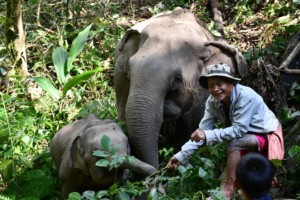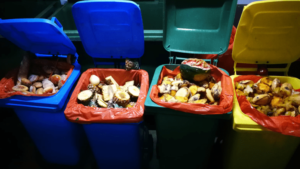Can tackling tourism income leakage unlock a more sustainable future for tourism?

‘Profit’, the much-maligned ‘P’ of sustainability, is a strong incentive for individuals, businesses, and communities to save and invest for the future; seek out and conserve what is of value; and reinvest.
Hotelier and entrepreneur Thomas Müller argues that taking a close look at tourism income leakage may prove … profitable … wherever our industry is most problematic.
It’s a “Good Tourism” Insight. (You too can write a “GT” Insight.)
Tourism is a powerful economic force that has the potential to transform not only communities, but entire nations.
It brings people together, fosters cultural exchange, and should generate significant revenue for its destinations.
However, as the old adage goes: “With great power comes great responsibility.”
When tourism income leaves a destination without benefiting the local population, the repercussions can be profound.
The ripple effect of tourism income leakage is not to be underestimated, but there is little awareness of this phenomenon.
Tourism income leakage and its effects on GNI
Tourism income leakage occurs when a significant portion of the money generated by tourism flows out of a destination’s economy or doesn’t even reach it in the first place, often ending up in foreign companies’ banks or their shareholders’ pockets.
This phenomenon can have a detrimental effect on a country’s Gross National Income (GNI), education, employment, as well as youth and women development.
When a large portion of tourism revenue leaks out or never arrives in the destination, it can result in a skewed representation of a country’s economic health, as the local population does not reap the full benefits of the industry.
The sustainability of economies at risk
Sustainable economies are those that can support a decent quality of life for current and future generations.
Tourism, when managed responsibly, can contribute significantly to a sustainable economy, including the 17 United Nations Sustainability Goals.
Tourism fosters education and training, creates jobs, boosts local businesses, supports youth and women development, and invests in infrastructure.
However, when tourism income leaks out or doesn’t reach the destination, the sustainability of the local economy is compromised and the tourism mandate is at stake.
Don’t miss other “Good Tourism” posts tagged ‘Sustainable & regenerative tourism’
Without a significant portion of the revenue remaining in the destination, there may be very limited resources available to drive any other sustainability project — ecological, social or cultural — or to invest in critical sectors such as education, healthcare, and social services.
Economic sustainability is the foundation of sustainability. WIthout it, ecological, cultural, and social sustainability initiatives become difficult if not impossible.
A responsible travel supply chain is an ethical imperative
Responsible travel is about making conscious choices that minimise negative impacts and maximise positive contributions to the places we visit.
We must educate travellers and create awareness as they become more and more conscious about sustainability. They play a significant role in ensuring that tourism income remains within a destination.
One way to minimise tourism income leakage is to encourage travellers to book directly at or with service providers in the destination. Those businesses then won’t have to pay hefty commissions to third party platforms outside the destination.
With the help of democratised digital tools, destinations and their businesses can become more independent, more visible, and more competitive online.
Their sales and profit may increase, and with that the economic sustainability of local providers and the entire destination.
Overtourism needs to be addressed
Traffic, litter pollution, and the damage done to local cultures and environments are just some of the degrading effects of overtourism. So, when destinations complain of overtourism, we need to think seriously and holistically about how to change this.
Low-cost vacations have contributed to negative environmental and social impacts in numerous popular destinations around the globe.
The quality of travellers matters. Much more than the quantity.
Striking a balance can be difficult, but limiting tourism income leakage is once again a first step; raising the value of each traveller to the destination so that a big numbers of travellers is less important … and less damaging.
The quality of life for locals will improve and with it their willingness to share an authentic experience with their visitors.
Tourism for good …
Tourism has the potential to be a force for positive change; especially in low- and middle-income countries where tourism has a mandate to create employment and prosperity and enable investments in education and people development.
But it requires a conscious effort from all stakeholders; governments, businesses, local communities, and, perhaps primarily, tourists.
Whether they know it or not, tourists determine whether their travel is responsible and sustainable simply by choosing where they book.
Booking with global market-dominating platforms is unsustainable for businesses and their destinations since 60% to 80% of the gross operating profit of such bookings never arrives at the destination, or it leaks straight out as payments to those platforms.
Also read Shane K Beary’s “GT” Insight ‘Supply lines: A former soldier’s take on tourism’s failure to win hearts & minds’
When booking directly with suppliers, travellers make sure 100% of their spend is reaching those suppliers, cutting out platform commissions.
This means more resources remain in the destination; resources that could potentially be reinvested in more sustainable tourism development.
Hoteliers and destinations need to regain their independence from OTAs and other tourism-related businesses that treat them as money-making sources.
… by democratising digital technologies
We need to democratise digital technology to help tourism businesses become more independent and more visible online via a strong and secure digital presence that keeps their distribution spread and costs under control.
Independent tourism businesses also want to be more directly involved in their own reputation management; they want to be competitive on their own terms.
Most of all, independent tourism businesses want to be able to harvest the fruits of their labour; to retain enough seeds to grow a more sustainable business and destination into the future.
It’s a transformation worth making, but it comes with a huge challenge; to overcome the apathy of an industry that has become dependent on others for too long and resulted in too much tourism income leakage from destinations and their stakeholders.
The good news is that a grassroots momentum is building. Sooner or later it will be unstoppable as more people recognise the importance of this transformation.
After all, the choices we make today will shape the future of responsible and sustainable travel and the world we leave behind for generations to come.
Agree? Disagree? What do you think about tourism income leakage?
Share a short anecdote or comment below. Or write a “GT” Insight of your own. The “Good Tourism” Blog welcomes diversity of opinion about travel & tourism because travel & tourism is everyone’s business.
Featured image (top of post): Can tackling tourism income leakage unlock a more sustainable future for tourism? Image by Steve Buissinne (CC0) via Pixabay.
About the author

Thomas Müller — hotelier, entrepreneur, and the founder of rainmaker.travel — drives the democratisation of digital technology for emerging and independent hospitality and tourism businesses.
For its impact on destinations, rainmaker.travel has received eight international awards in Africa, the USA, and Europe. “With direct bookings, the revenue stays 100% with the providers and in the destination.”





